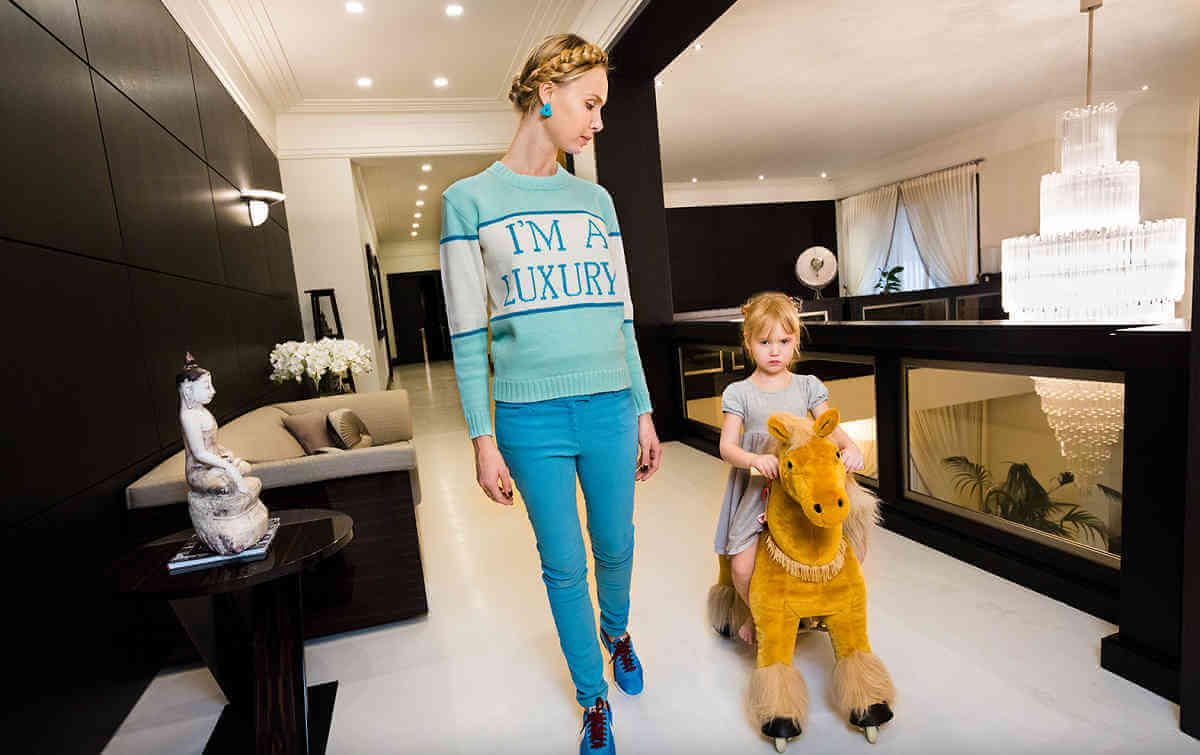Director Lauren Greenfield’s film “Generation Wealth” is the third version of her dystopian take on contemporary American culture sharing that name, following a collection of photos printed in a monograph and shown in New York at the International Center of Photography last year.
But the medium of film allows us to hear her voice directly. Greenfield implicates herself in the story she tells about rich kids in LA wrecking themselves in a world where Kim Kardashian has more influence than any novelist or painter. Chris Hedges offers commentary throughout, but his moralistic scolding about “sexual hedonism” and “mass culture, especially TV, as an instrument of violence” suggests he lives at a monastic, pleasure-free remove from American life. Greenfield has worked for glossy magazines and directed advertising, while theoretically critiquing the way pop culture commodifies women’s bodies and encourages everyone to think they can become rich and famous.
Greenfield started out with a background in anthropology, but depicting other cultures didn’t interest her. (She became fascinated by Russia and China when they abandoned communist asceticism and dived headfirst into consumerism along with us.) After reading Bret Easton Ellis’ novel “Less Than Zero,” she began to see the wealthy LA teenagers she grew up among in ethnographic terms. This led to a series of photos of jaded 13-year-olds waving $100-bills while name-dropping Kate Hudson and saying “money ruins kids.” She shot a picture of the teenage son of REO Speedwagon’s singer partying in a Jacuzzi. More than 20 years later, she returns to the subjects of her earlier work, now in their late 30s or early 40s, to see how they’re doing and examine her own life.
The problem with “Generation Wealth” is that it tries for three different narrative arcs: illustrating the dying empire amused to death by the excess Hedges attacks on a macro level, then making points with individual stories of many individuals — a self-destructive adult film star who had a brush with more mainstream fame via Charlie Sheen, a crooked businessman who was a Harvard classmate of Greenfield’s, a woman whose desire for plastic surgery after pregnancy changed her body led to crippling debt — and exploring Greenfield’s own life. Around the hour mark of this 106-minute film, Greenfield says that chronicling her subjects’ many obsessions led her to realize she’s addicted to work in ways that have meant neglecting her family. Her teenage sons confirm this.
While “Generation Wealth” is heavily reliant on talking-head interviews, it also uses a lot of the director’s photos. With one exception, she never pretends to speak for poor people. Adult film star Kacey Jordan (who uses three names during the period Greenfield chronicled her life) started out barely able to afford 89-cent fast food at Taco Bell but was able to send money to family members within a year of her debut in porn.
Greenfield’s film suffers from a heavy-handed structure. She repeatedly uses the device of montages of several people saying variations on the same thing.
The themes of “Generation Wealth” are predictable: American pop culture’s emphasis on beauty, as defined fairly narrowly, has a huge and negative impact on women and the pursuit of money over everything else is dangerous. These ideas are certainly true. But when its final 20 minutes ends with the people Greenfield had earlier depicted pursuing wealth, fame, and beauty being satisfied living without owning a TV set and going from banking to fishing, it feels facile. Greenfield herself obviously finds the world she depicts simultaneously alienating and fascinating; if her work has become an addiction, it seems to be because she finds it fulfilling, not because she works 100 hours a week in pursuit of millions. She’s also avoided damaging her body the way so many of the women in “Generation Wealth” have. Engaging with a difficult world while acknowledging one’s complicity with it the way that she has seems a better response than going off the grid.
Paris, the neglected child of REO Speedwagon’s singer, survived his drug abuse and is now a clean and sober family man. Another subject of her early photos, “G-Mo,” gave up his dreams of being a rapper (who is shown in ludicrously materialistic videos) and now uses his real name, Cliff, and concentrates on raising his teenage kids to value education over money. But what if one wants to have a career as a filmmaker, instead of giving up their ambitions and settling down?
Greenfield’s excellent last feature, “The Queen of Versailles,” was a cautionary tale about the rise and fall of a couple of rich vulgarians, but it eventually aired on the hyper-capitalist CNBC cable network. In 2018, America does not have a lot of room for artists who want to be able to make a living off their work without engaging in branding themselves or becoming careerists — one of our best independent directors, Kelly Reichardt, gets by working as a teacher, not through her film projects, and even the putatively more mainstream James Gray has admitted he struggles financially. That’s not the story “Generation Wealth” tells, but it’s a worthy subject for another film.
____
GENERATION WEALTH | Directed by Lauren Greenfield | Amazon Studios | Opens Jul. 20 | Angelika Film Center, 18 W. Houston St. at Mercer St.; angelikafilmcenter.com/nyc Film Society of Lincoln Center, Elinor Bunin Munroe Film Center, 144 W. 65th St. | filmlinc.org



































